2019年秋季八年级英语上册Section A (GF-3c) 教学课件 (10)
合集下载
人教版八年级英语上册Unit 2 Section A (GF-3c)

➢He is never late for class.
never(0%) 从不
2 表示具体的频率、次数时,通常用once a week(一周一 次),twice a month(一月两次),three times a year(一年 三次)等。
➢I use the Internet twice a week. ➢Li Ming and his parents go to the park three or four times a
频度副词(frequency adverb)
频度副词表示某一动作或状态出现的频率,即在一定时间内某一 动作或状态重复出现的次数,常用来回答how often的提问。
➢I always exercise. ➢I go to the movies maybe once a month. ➢No, I never go shopping.
read English books sing English songs watch English programs listen to English tapes go to the English corner (参加英语角) chat with foreigners (与外国人聊天) write English diaries...
—Do you...? —Yes, I do. / No, I don’t.
➢ Let’s make conversations with partners !
A: How often do you …? B: once a week/ every day / twice a month
/hardly ever / never / sometimes/…
人教版英语八年级上册同步多媒体教学 Unit 1 Section A (GF-3c) 课件
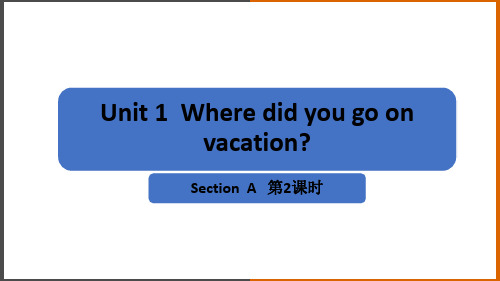
anything, everything, nothing, everyone, no one
We fed some hens and saw some baby pigs. They were so cute! The only problem was that there was _n_o_t_h_in_g_ much to do in the evening but read. Still __n_o_o_n__e__ seemed to be bored. Bye for now! Mark
2.Did you go shopping? 你们去购物了吗? go shopping: 去购物;去买东西 相当于do some shopping. (同义短语)
e.g. 我通常星期天去购物。
I usually go shopping on Sundays.
拓展:“go + doing”形式表示“去做某事”,常用于表达从
语法要点: 1.一般过去时
当句中有表示过去的时间状语时,谓语动词要用一般 过去时。一般过去时常有的标志词:yesterday, the day before yesterday, the other day…ago, last night/ week/month,in+过去的年份等。
2.复合不定代词
go skateboarding去进行滑板运动
3b Fill in the blanks in the e-mail message with the words in
the box.
anything, everything, nothing, everyone, no one
Dear Bill, How was your vacation? Did you do _a_n_y_t_h_i_n_g_ interesting? Did _e_v_e_ry_o_n__e in the family go with you? I went to a friend’s farm in the countryside with my family. _E__v_e_ry_t_h_i_n_g_ was great.
人教版八年级英语上册Unit 9 Section A (GF-3C)课件
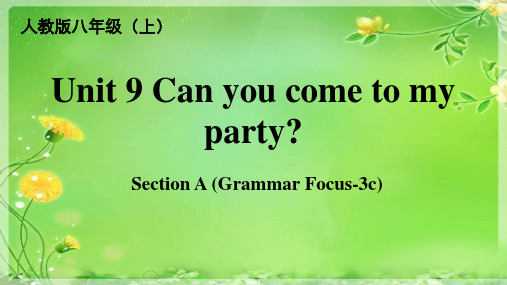
(sample answers)
Watch a video. Pay attention to the sentences that can be used to make invitations.
4. Invitation: “Do you want to go shopping with me next week?” Reply: _____________________________________
5. Invitation: “Can you play soccer with me after school today?” Reply: _____________________________________
Can you go to the movies tomorrow night?
Sure. That sounds great. I’m afraid not. I have the flu.
Can he go to the party?
No, he can’t. He has to help his parents.
Can they go to the movies?
观察一下,can表示“邀请”时句型结 构是什么样的?
Can is used for making
invitations in these
sentences.
情态动词can还可以表 示“邀请”。但是在 表示“邀请”时could 比can更委婉、更礼貌, 如Could you join us for the dinner?
3. A:When will you finish the science homework? B: _I_d_o_n_’_t _kn_o_w__. _I _m_i_gh_t_f_i_ni_s_h_i_t _o_n_th_e__w_e_e_k_end.
Watch a video. Pay attention to the sentences that can be used to make invitations.
4. Invitation: “Do you want to go shopping with me next week?” Reply: _____________________________________
5. Invitation: “Can you play soccer with me after school today?” Reply: _____________________________________
Can you go to the movies tomorrow night?
Sure. That sounds great. I’m afraid not. I have the flu.
Can he go to the party?
No, he can’t. He has to help his parents.
Can they go to the movies?
观察一下,can表示“邀请”时句型结 构是什么样的?
Can is used for making
invitations in these
sentences.
情态动词can还可以表 示“邀请”。但是在 表示“邀请”时could 比can更委婉、更礼貌, 如Could you join us for the dinner?
3. A:When will you finish the science homework? B: _I_d_o_n_’_t _kn_o_w__. _I _m_i_gh_t_f_i_ni_s_h_i_t _o_n_th_e__w_e_e_k_end.
新目标八年级英语上Unit9 Section A(GF-3c)课件

A: Can you go to the concert? B: I’m sorry, I can’t. I have to prepare for an exam.
go to movies
A: Can you go to the movies? B: I’m sorry, I can’t. I have to go
八年级(上)
Unit 9
Can you come to my party?
Section A (GF-3c)
学习目标
➢ Key words & phrases:
invite,accept,refuse,study for a math test, on the weekend,practice the violin
to the doctor. A: Can he go to the movies? B: No, he can’t. He has to go to the
doctor.
go to the dolp my parents
A: Can you go to the zoo? B: Sorry, I can’t. I have to help
doctor.
➢ Make, accept and decline invitations.
Lead in
Review
birthday party
A: Can you come to my birthday party? B: Sure, I’d love to.
go to the concert prepare for an exam
-- Can you go to the baseball game? 你能去参加棒球比赛吗?
go to movies
A: Can you go to the movies? B: I’m sorry, I can’t. I have to go
八年级(上)
Unit 9
Can you come to my party?
Section A (GF-3c)
学习目标
➢ Key words & phrases:
invite,accept,refuse,study for a math test, on the weekend,practice the violin
to the doctor. A: Can he go to the movies? B: No, he can’t. He has to go to the
doctor.
go to the dolp my parents
A: Can you go to the zoo? B: Sorry, I can’t. I have to help
doctor.
➢ Make, accept and decline invitations.
Lead in
Review
birthday party
A: Can you come to my birthday party? B: Sure, I’d love to.
go to the concert prepare for an exam
-- Can you go to the baseball game? 你能去参加棒球比赛吗?
八年级英语上册Unit 4单元:Section A (GF-3c) 教学课件

Danny’s
How much is a meal?
How far is it from 10 minutes by bus your home?
Is the service good?
Danny’s is the best one
Is the food good?
because it’s
the closest.
他在我们班上最高。 He is __th_e__ta_l_l_es_t_ ( tall) __i_n__ our class.
玛丽是这三个学生中最小的。 Mary is t_h_e_y_o_u_n_g_e_s_t (young) __o_f ___ the three students.
构成规律: 规则变化 单音节词 和部分双 音节词
辅音字母若加y, 记得把y变为i。
(friendly—the friendliest)
多音节,考考你,the most到底加哪里?
(popular—the most popular)
形容词的原形、比较级和最高级
原级 big cheap new close expensive popular comfortable interesting
far
farther/
farthest/
further
furthest
最高级规则变化口诀
最高级,很容易,一般词尾加est。
(cheap—the cheapest)
词尾若有哑音e, 直接就加st。
(close—the closest)
重读闭音节, 单辅音字母要双写。
(big—the biggest)
形容词最高级前通常必须用定冠词 the。 例如:
人教版八年级英语上册-第五单元unit5-Section A (GF-3c) 教学课件

I like it./I don't mind it./I don't like it./ I can't stand it./I like it very much./I love it./ It's beautiful./They're fantastic.
Look and say
A: Do you want to go to a movie? B: Yes, I do. I want to see an _a_ct_i_o_n_m__o_v_ie_.
而要询问对方有什么打算时用: What do you plan to do…?
“ plan to do sth.” 打算/计划做某事。 例如: --What do you plan to watch tonight? --I plan to watch Days of Our Past.
A: What do you plan to watch tonight? B: I plan to watch Mr. Bean.
I plan to watch Days of Our Past.
To express likes and dislikes.
Lead in
Review
What do you plan to watch tonight?
I plan to watch the news.
What do you plan to watch tonight? I plan to watch the talk shows.
show?
3b Answer these questions. Give answers that are true for you.
Look and say
A: Do you want to go to a movie? B: Yes, I do. I want to see an _a_ct_i_o_n_m__o_v_ie_.
而要询问对方有什么打算时用: What do you plan to do…?
“ plan to do sth.” 打算/计划做某事。 例如: --What do you plan to watch tonight? --I plan to watch Days of Our Past.
A: What do you plan to watch tonight? B: I plan to watch Mr. Bean.
I plan to watch Days of Our Past.
To express likes and dislikes.
Lead in
Review
What do you plan to watch tonight?
I plan to watch the news.
What do you plan to watch tonight? I plan to watch the talk shows.
show?
3b Answer these questions. Give answers that are true for you.
人教英语八年级上9单元_Section A (GF-3c) 教学课件

Presentation
Explanation
Can you ...? 意为“你能„„吗?”,可用 于邀请别人或委婉地请求某人去做某事。其肯 定回答常用 Sure, I‟d love / like to. ,否定回答 常用 I‟m sorry, I can‟t. / Sorry, I can‟t. 等。如: -- Can you go to the baseball game? 你能去参加棒球比赛吗? -- I‟m sorry, I can‟t. 对不起,我不能。
Key sentences:
1.—Can you come to my party on Saturday? —Sure,I'd love to. /Sorry,I must study for a math test. 2.—Can she go to the baseball game? —No,she's not available. She must go to the doctor.
go to the doctor
go to the zoo
A: Can you go to the zoo? B: Sorry, I can‟t. I have to help my parents. A: Can he go to the zoo?
help my parents
B: No, he can‟t. He has to help his parents.
prepare for an exam
B: I‟m sorry, I can‟t. I have to prepare for an exam.
go to movies
A: Can you go to the movies? B: I‟m sorry, I can‟t. I have to go to the doctor. A: Can he go to the movies? B: No, he can‟t. He has to go to the doct to与其他的情态动词如can,may,must和 should 不同。 (1)这4个情态动词没有人称的变化, 而have to有。它的第 三人称单数为“has to”。 You / He should study hard. 你/他应该好好学习。 He has to study hard. 他不得不好好学习。
最新人教PEP版八年级上册英语Unit 7-Section A (GF-3c) 精品教学课件

2) be going to 表示根据主观判断将来肯 定发生的事情,will表示客观上将来势 必发生的事情。 He is seriously ill. He is going to die. He will be twenty years old.
最新人教PEP版八年级上册英语精品课件
3) be going to 含有“计划,准备”的意 思,而 will 则没有这个意思。如: She is going to lend us her book. He will be here in half an hour.
最新人教PEP版八年级上册英语精品课件
4)特殊疑问句的构成和用法:
句型:特殊疑问词+一般疑问句
-How are they going to school tomorrow?
-By bike.
-What is he going to do next Sunday?
-He is going to read books.
八年级(上)
最新人教PEP版八年级上册英语精品课件
Unit 7
Will people have robots?
Section A (GF-3c)
最新人教PEP版八年级上册英语精品课件
学习目标
Key words & phrases:
peace,sea,sky,world peace,the same as, in the future
1.概念: (1) 表示将要发生的动作或存在的状态。
We will go to see him tomorrow. 我们明天去看他。 (2) 表示将来经常或反复发生的动作。 From now on I will come every day. 从现在起我将每天来。
最新人教PEP版八年级上册英语精品课件
3) be going to 含有“计划,准备”的意 思,而 will 则没有这个意思。如: She is going to lend us her book. He will be here in half an hour.
最新人教PEP版八年级上册英语精品课件
4)特殊疑问句的构成和用法:
句型:特殊疑问词+一般疑问句
-How are they going to school tomorrow?
-By bike.
-What is he going to do next Sunday?
-He is going to read books.
八年级(上)
最新人教PEP版八年级上册英语精品课件
Unit 7
Will people have robots?
Section A (GF-3c)
最新人教PEP版八年级上册英语精品课件
学习目标
Key words & phrases:
peace,sea,sky,world peace,the same as, in the future
1.概念: (1) 表示将要发生的动作或存在的状态。
We will go to see him tomorrow. 我们明天去看他。 (2) 表示将来经常或反复发生的动作。 From now on I will come every day. 从现在起我将每天来。
八年级英语上册Unit 5单元:Section A (GF-3c) 教学课件

八年级(上)
八年级英语上(RJ) 教学课件
Unit 5
Do you want to watch a game show?
Section A (GF-3c)
学习目标
Key words & phrases:
joke,comedy,watch a movie/sitcom/sports
Key sentences:
show?
3b Answer these questions. Give answers that are true for you.
1. What do you think of game shows? _______________________________________
2. What comedy shows do you like to watch? _______________________________________
Why do you like watching the news?
Because I hope to find out what’s going on around the world.
What do you think of I don’t mind them. / I can’t
talk shows?
Do you want to watch
Grammar Focus
the news?
Yes, I do./ no, I don’t.
What do you plan to I plan to watch Days of Our
watch tonight?
Past.
What can you expect You can learn some great to learn from sitcoms? jokes.
八年级英语上(RJ) 教学课件
Unit 5
Do you want to watch a game show?
Section A (GF-3c)
学习目标
Key words & phrases:
joke,comedy,watch a movie/sitcom/sports
Key sentences:
show?
3b Answer these questions. Give answers that are true for you.
1. What do you think of game shows? _______________________________________
2. What comedy shows do you like to watch? _______________________________________
Why do you like watching the news?
Because I hope to find out what’s going on around the world.
What do you think of I don’t mind them. / I can’t
talk shows?
Do you want to watch
Grammar Focus
the news?
Yes, I do./ no, I don’t.
What do you plan to I plan to watch Days of Our
watch tonight?
Past.
What can you expect You can learn some great to learn from sitcoms? jokes.
人教版八年级英语上册Unit 1 Section A GF-3c

我认为任何人都会做。
(2) 修饰复合不定代词something, anyone等的adj , adv, to do 不定式等要放在不定代词的后面。如: Did you meet _a_n_y_o_n_e__in_t_e_r_e_st_i_n_g__? 你遇见有趣的人了吗? I have _n_o_t_h_i_n_g_ to do today. 我今天没什么事可做。
3b
Fill in the blanks in the e-mail message with the words in the box.
anything everything nothing everyone no one
Dear Bill, How was your vacation? Did you do _a_n_y_th_i_n_g_ interesting? Did_e_v_e_r_y_o_n_e in the family go with you? I went to a friend’s farm in the countryside with my family. _E_v_e_r_y_th_i_n_g_was great.
(4) no系列的不定代词可与not ... any 系列的不定代词替换。 eg. I bought nothing.= I _d_id__n_’t_ buy __a_n_y_th__in_g___. 我什么也没买。
反身代词小结:
myself (我自己) , yourself (你自己)是反身代词。表示“某人 自己的词”叫反身代词。见下表:
was really interesting.
Linda: Did you go with__a_n_y_o_n_e___? Alice: Yes, I did. I went with my sister. Linda: Did you go shopping? Alice: Of course! I bought_s_o_m_e_t_h_i_n_g_ for my parents, but _n_o_t_h_in__g__for myself. 我自己 Linda: Why didn’t you buy_a_n_y_t_h_i_n_g__ for yourself? 你自己 Alice: I didn’t really see _a_n_y_t_h_i_n_g____I liked.
(2) 修饰复合不定代词something, anyone等的adj , adv, to do 不定式等要放在不定代词的后面。如: Did you meet _a_n_y_o_n_e__in_t_e_r_e_st_i_n_g__? 你遇见有趣的人了吗? I have _n_o_t_h_i_n_g_ to do today. 我今天没什么事可做。
3b
Fill in the blanks in the e-mail message with the words in the box.
anything everything nothing everyone no one
Dear Bill, How was your vacation? Did you do _a_n_y_th_i_n_g_ interesting? Did_e_v_e_r_y_o_n_e in the family go with you? I went to a friend’s farm in the countryside with my family. _E_v_e_r_y_th_i_n_g_was great.
(4) no系列的不定代词可与not ... any 系列的不定代词替换。 eg. I bought nothing.= I _d_id__n_’t_ buy __a_n_y_th__in_g___. 我什么也没买。
反身代词小结:
myself (我自己) , yourself (你自己)是反身代词。表示“某人 自己的词”叫反身代词。见下表:
was really interesting.
Linda: Did you go with__a_n_y_o_n_e___? Alice: Yes, I did. I went with my sister. Linda: Did you go shopping? Alice: Of course! I bought_s_o_m_e_t_h_i_n_g_ for my parents, but _n_o_t_h_in__g__for myself. 我自己 Linda: Why didn’t you buy_a_n_y_t_h_i_n_g__ for yourself? 你自己 Alice: I didn’t really see _a_n_y_t_h_i_n_g____I liked.
2019年人教版新课标英语八年级上册Section A (GF-3c)优质课课件

watch TV
Accept (接受) invitations:
Sure / Yes / Of course, I’d love to. Certainly, I’d like to.
Decline (拒绝) invitations:
I’m sorry, I can’t. I have to look after my grandmother. I have to study for a math test. I am going shopping with my friend. …
(2)这4个情态动词在一般疑问句中将它们放在
句首, 在否定句中直接在他们后边加not即可。
我们以can为例: Can he go with us?他能和我们一起去吗? He can’t go with us.他不能和我们一起去。 而have to要加助动词do , does或 did 才 可能完成其疑问、否定句。
A: Can you go to the concert? B: I’m sorry, I can’t. I have to prepare for an exam.
go to movies
A: Can you go to the movies? B: I’m sorry, I can’t. I have to go to the doctor. A: Can he go to the movies? B: No, he can’t. He has to go to the doctor.
Presentation
Explanation
Can you ...? 意为“你能……吗?”,可用 于邀请别人或委婉地请求某人去做某事。其肯 定回答常用 Sure, I’d love / like to. ,否定回答 常用 I’m sorry, I can’t. / Sorry, I can’t. 等。如: -- Can you go to the baseball game? 你能去参加棒球比赛吗? -- I’m sorry, I can’t. 对不起,我不能。
人教版英语八年级上册Section A (GF-3c) 教学课件课件牛老师

I help with housework every day.
What do you usually do on weekends?
I usually watch TV on weekends.
How often does your best friend exercise?
My best friend exercises twice a week.
How often do you go to the movies? How often does he watch TV? Do you go shopping?
I go to the movies maybe once a month. He hardly ever watches TV. No, I never go shopping.
—I exercise every day/ once a week/... 我每天/每周锻炼一次/……
3a Complete the questions with do or does. Then
match the questions and answers.
1. How often _d_o_e_s__ he play soccer?
What do you usually do after school?
I usually play basketball after school.
A: What do you usually do at weekends? B: I like going shopping. A: How often do you go shopping? B: Twice a month. A: Why do you like it? B: It’s exciting.
人教版英语八年级上册Section A (GF-3c)教学课件课件

How are you going to do that? I’m going to go to a cooking school.
“be + going to+动词原形”
• 表示计划或根据某些现象或征兆预测不 久即将发生的事情。含有“打算”之意。
• 常与 tomorrow, next Sunday, next month, the day after tomorrow 等表示将来的时 间状语连用。
going to+do
• Read the sentences in Grammar Focus. • Talk about your future intentions with your partner. • Preview the new words and expressions in next lesson.
_b__ 8. I want to be a race car driver. lessons.
3b Fill in the blanks. Then practice the conversation.
A: Kelly, what do you want to be _w__h_e_n__ you
►为你理想的人,否则,爱的只是你在他身上找到的你的影子。 ►冲冠一怒为红颜,英雄难过美人关。只愿博得美人笑,烽火戏侯弃江山。 宁负天下不负你,尽管世人唾千年。容颜迟暮仍为伴,倾尽温柔共缠绵。 ►蜜蜂深深地迷恋着花儿,临走时留下定情之吻,啄木鸟暗恋起参天大树, 转来转去想到主意,便经常给大树清理肌肤。你还在等待什么呢?真爱是 靠追的,不是等来的!
f. I’m going to study science.
_c__ 6. My friend and I want to be g. He’s going to go to a cooking
新人教版英语八年级上册Section A 3a--3c课件
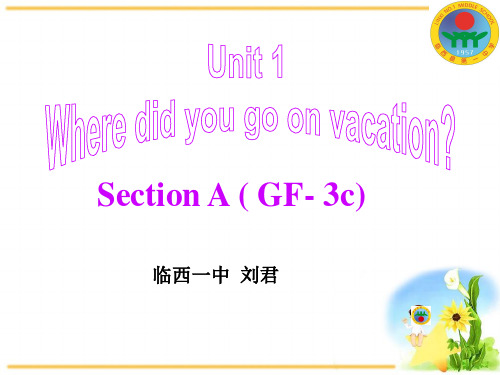
went to the movies did my homework played tennis played soccer cleaned the room
go to the movies do my homework play tennis play soccer clean the room
动词一般过去时, 表示过去发生的事;
E__v_e_ry_t_h_i_n_g_ _t_a_st_e_d__ really good. 10. 每个人都玩得很开心吗?
_D_i_d__ _e_v_er_y_o_n_e_ have a good time? 11. 是的。一切事物都很棒。 Yes. __E__v_er_y_t_h_i_n_g_ was excellent.
2. 带some的复合不定代词常用于肯定句 中;带any的复合不定代词常用于否定 句或一般疑问句中。例如: 我想吃点东西。
I’d like _s_o_m__e_th_i_n_g__ to eat. 今天有人给我打电话吗?
Did _a_n__y_o_n_e_ call me today?
3. 当形容词修饰不定代词时,应放在其 后面。例如: 这本书里有什么新东西吗? Is there __a_n_y_th__in_g_ _n_e_w__ in this book? 今天没有什么特别的事。
(1). Did you buy anything for yourself?
你为你自己买什么东西了吗?
(2). The old man taught himself English.
1. I ___h_a_d____ (have) an exciting party last weekend.
2. ____D__id___ she ___p_r_a_c_ti_c_e (practice) the guitar yesterday? No, she ___d_id__n_’t__.
人教版八年级英语上册-第一单元-unit1-Section A (GF-3c) 教学课件

_E_v_e_r_y_t_h_in_g__ was great. We fed some hens and saw some baby pigs. They were so cute! The only problem was that there was _n_o_t_h_in_g_ much to do in the evening but read. Still _n_o__o_n_e_ seemed to be bored. Bye for now! Mark
八年级(上)
Unit 1
Where did you go on vacation?
Section A (Grammar Focus-3c)
学习目标
Key words & phrases:
something,nothing,everyone,myself, yourself,someone,seem,bored,diary go out,have a good time,of course,keep a diary
A: Are there any apples in the fridge? B: Yes, there are some.
/ No, there aren’t any. A: Is there any water in the bottle? B: Yes, there is some water.
某物
(指两个以上)
other(s) 另一个 (些)
another 另外一 个;又一个
much 很多 many 很多
neither 没人或物
(指两个当中)
anybody 任何 either 任何一个
人
(指两个当中)
人教版八年级英语上册2. U8 A (GF-3c) -课件
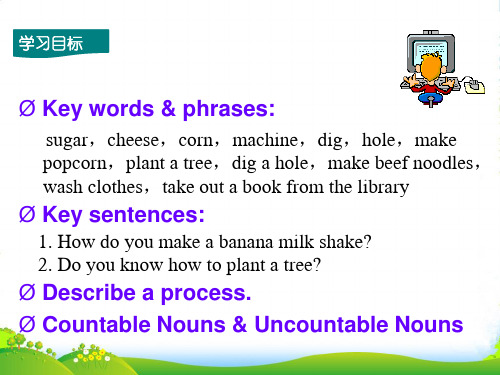
学习目标
Ø Key words & phrases:
sugar,cheese,corn,machine,dig,hole,make popcorn,plant a tree,dig a hole,make beef noodles, wash clothes,take out a book from the library
__b__ 1. __H__o_w_____ do you make popcorn? __a__ 2. _H_o_w__m_u_c_h__ corn do we need? __d__ 3. ___W__ha_t____ do we do next? __e__ 4. _H_o_w__m_u_c_h__ salt do we need? __c__ 5. Now can we eat it?
How to make popcorn?
First, put the popcorn into the popcorn popper.
Next, turn on the popper.
Next, pour the popcorn into a bowl. Then, put some salt on the popcorn.
Presentation
3a Circle the correct word in each question.
1. How (much/many) bananas do we need? 2. How (much/many) sugar do we need? 3. How (much/many) bread do we need? 4. How (much/many) tomatoes do we need? 5. How (much/many) cheese do we need?
Ø Key words & phrases:
sugar,cheese,corn,machine,dig,hole,make popcorn,plant a tree,dig a hole,make beef noodles, wash clothes,take out a book from the library
__b__ 1. __H__o_w_____ do you make popcorn? __a__ 2. _H_o_w__m_u_c_h__ corn do we need? __d__ 3. ___W__ha_t____ do we do next? __e__ 4. _H_o_w__m_u_c_h__ salt do we need? __c__ 5. Now can we eat it?
How to make popcorn?
First, put the popcorn into the popcorn popper.
Next, turn on the popper.
Next, pour the popcorn into a bowl. Then, put some salt on the popcorn.
Presentation
3a Circle the correct word in each question.
1. How (much/many) bananas do we need? 2. How (much/many) sugar do we need? 3. How (much/many) bread do we need? 4. How (much/many) tomatoes do we need? 5. How (much/many) cheese do we need?
人教版英语八年级上册Unit 10SectionA (GF-3c) 课件

Pre-grammar
Mom’s advice.
Lisa wants to be fit.
If she __e_a_t_s__ healthy food, she __w__i_ll__ be fit.
While-Grammar Let’s think and sum up.
从句
条件状语从句:用法和时态
你可以分别找到主句和从句吗?
While-Grammar Let’s think and sum up.
条件状语从句:用法和时态
If she _s_le__e_p_s_ early, she ___w__i_ll be able to get up early. If she __s_tu__d_i_e_s_ hard, she ___w__i_ll be the first. If she __e__a_t_s_ healthy food, she __w__il_l__ be fit.
Exercises
一、完成句子。 (1) Put up your hands if you _h_a_v_e_ (have) any questions. (2) If it _i_s__ (be) cold tomorrow, I will wear my sweater. (3) He can go home if he _f_i_n_is_h_e_s_ (finish) his homework. (4) 如果他来了,我们会让你知道的。
主句
If she _s_l_e_e_p__s early, she ___w__il_l be able to get up early. If she __s_t_u_d_i_e_s_ hard, she ____w_i_llbe the first. If she __e_a__ts__ healthy food, she ____w__i_ll be fit.
人教版八年级英语上册(初二)Unit 2 Section A GF-3c 课件
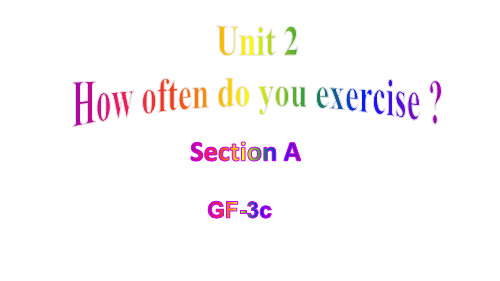
a. Yes. She usually does. b. Hardly ever. I don’t like them. c. He plays at least twice a week. d. No, they don’t. They’re too busy. e. Never. They always go to bed early. f. Yes, I do. Every day.
/Hardly ever/Never/Sometimes/…
read English books sing English songs watch English programs listen to English tapes join the English corner (参加英语角) chat with foreigners(与外国人聊天) write English diaries read English stories play English games
A: How often do … give homework? B: … give homework.
3c What can you do to improve your
English? Add more things to the chart. Then ask your classmates the questions and find the best English student.
4. ________________________________? (what/ usually /do /after school )
A: How often do … sing songs? B: … sing songs.
相关主题
- 1、下载文档前请自行甄别文档内容的完整性,平台不提供额外的编辑、内容补充、找答案等附加服务。
- 2、"仅部分预览"的文档,不可在线预览部分如存在完整性等问题,可反馈申请退款(可完整预览的文档不适用该条件!)。
- 3、如文档侵犯您的权益,请联系客服反馈,我们会尽快为您处理(人工客服工作时间:9:00-18:30)。
__b__ 1. ___H_o_w_____ do you make popcorn? __a__ 2. _H_o_w__m_u_c_h__ corn do we need? __d__ 3. ___W__h_at____ do we do next? __e__ 4. _H_o_w__m_u_c_h__ salt do we need? __c__ 5. Now can we eat it?
注:回答不可数名词量多少时,数词后一 定要有容器量词。
eg: a cup of tea two glasses of water three pieces of paper four spoons of honey
Practice
Practice
A: How many bananas are there in the picture?
do it.
Do you know how to plant a tree?
First, dig a hole. Then …
plant a tree make beef noodles wash clothes take out a book from the library
Can you make noodles with beef and tomatoes?
物质名词一般是不可数名词,它们所表示的事物不 能用数来计数。 如: milk, yogurt …
不可数名词要加表示容器或体积大小的名词, 与of构成短语才能表示量。如:
a piece of paper two spoons of honey a cup of yogurt a bar of chocolate
八年级英语上(RJ) 教学课件
Unit 8
How do you make a banana milk shake?
Section A (GF-3c)
学习目标
Key words & phrases:
sugar, cheese, corn, machine, dig, hole, make popcorn, plant a tree, dig a hole, make beef noodles, wash clothes, take out a book from the library
Now let’s make popcorn.
We need ___________.
•corn
•salt
•popcorn
•popcorn machine •bowl
3b Complete the questions and answers. Then match them.
____ 1. ___H__o_w____ do you make popcorn? ____ 2. _H_o_w__m__u_c_h_ corn do we need? ____ 3. ___W__h_a_t___ do we do next? ____ 4. _H_o_w__m__u_c_h_ salt do we need? ____ 5. Now can we eat it?
可数名词复数可用 a few, many 等修饰;不可数名 词则用 a little, much 等修饰。
询问可数名词的“多少” 用how many; 询问不可数名词的“多少” 用 how much。
英语中个体名词是可数名词,它们所表示的人或物 可以用数来计数。 如:banana, apple, blender, watermelon …
Presentation
3a Circle the correct word in each question.
1. How (much/many) bananas do we need? 2. How (much/many) sugar do we need? 3. How (much/many) bread do we need? 4. How (much/many) tomatoes do we need? 5. How (much/many) cheese do we need?
a. Half a cup. b. __F__ir_s_t___, put the corn into the popcorn
machine. c. Yes, we can! d. Next, __t_u_r_n____ on the machine.
__F_in_a_l_l_y__, add the salt. e. Just one spoon.
Lead in
Do you like fruit salad?
How to make fruit salad?
You need these things:
watermelons
oranges
apples
honey
bananas
yogurt
First … Next … Then … Finally …
2.A: How _m_a_n_y_ watermelons do we need? B: We need four.
3.A: How _m_a_n_y_ oranges do you need? B: Two.
4.A: How _m_u_c_h_ orange do you need? B: Two cups.
How to make popcorn?
First, put the popcorn into the popcorn popper.
Next, turn on the popper.
Next, pour the popcorn into a bowl. Then, put some salt on the popcorn.
Homework
• Revise the sentences in Grammar Focus. • Practice how to describe a procedure.
B: There are three./Three.
A: How much milk are there in the picture?
B: There are two glasses./Two glasses.
A: How many watermelons do you eat every day?
First … Next … Then … After that … Finally …
Revision
Countable nouns & Uncountable nouns 可数名词有单数和复数两种形式,如:bananas, tomatoes。不可数名词没有单、复数形式。
可数名词单数前面可用不定冠词a (an); 不可数名词前不能有a (an)。
Then, put the stuffing into the flour over.
Finally, put them into the pot to boil them.
3c Write how to do one of the following things. Then tell your partner how to
First, cut up the tomatoes and beef. Next, boil the noodles. Then, add the ingredients to the noodles. Finally, add salt to the noodles.
课堂小结
描述过程顺序的词汇
B: I eat four./Four.
A: How much honey do you drink every day?
B: I drink four spoons./Four spoons.
Please use many or much to fill in the blanks.
1.A: How _m_u__ch_ watermelon do we need? B: We need four pieces of watermelon.
Finally, you can try it.
Have you ever tried cooking? What do you cook? Share your experience with others.
How to make dumplings?
First, cut up the meat and vegetables to make stuffing. Next, mix up the flour and the water.
Key sentences:
1. How do you make a banana milk shake? 2. Do you know how to plant a tree?
Describe a process. Countable Nouns & Uncountable
Nouns.
How many & How much
1. How many + 可数名词复数形式 + …? eg:—How many students are there in our class? —There are sixty-one./ Sixty-one.
2. How much + 不可数名词 + …? eg: —How much water do you drink every day? —I drink five glasses./Five glasses.
a. Half a cup. b. __F__ir_s_t___, put the corn into the popcorn machine. c. Yes, we can! d. Next, __t_u_r_n____ on the machine. __F_i_n_a_ll_y__, add the salt. e. Just one spoon.
